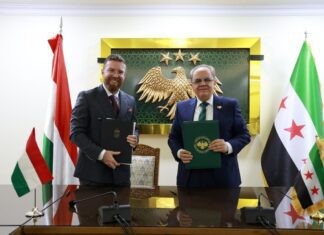
Syria has entered a critical phase of rebuilding and governance following the removal of the dictator Bashar al-Assad. Revolutionary leaders and former regime officials are working together to establish a transitional government aimed at maintaining stability, preserving state institutions, and ensuring justice and accountability.
At the heart of the transition is Muhammad Al-Bashir, the newly appointed Prime Minister of the Syrian Salvation Government (SSG), who has been tasked with forming a government to manage the delicate transitional period. Al-Bashir, a technocrat with experience in governance, has pledged to prioritize stability, societal reconciliation, and the preservation of institutional integrity.
“We will focus on vital sectors, creating job opportunities, and encouraging investments,” Al-Bashir said, emphasizing the need to rebuild Syria’s shattered infrastructure and economy.
A key meeting at the Four Seasons Hotel in Damascus brought together former regime Prime Minister Muhammad Ghazi al-Jalali, CMO Commander Ahmed al-Sharaa, and Al-Bashir to outline mechanisms for the transfer of power. It was agreed that Al-Jalali would assist in handing over executive duties to the transitional government to avoid an administrative vacuum.
Ahmed al-Sharaa, leader of the revolution’s Command of Military Operations (CMO), vowed accountability for those responsible for war crimes and human rights abuses during Assad’s rule.
“We will pursue war criminals and demand their extradition to face justice,” Sharaa said, announcing plans to release a list of high-ranking individuals implicated in atrocities. At the same time, the transitional government has granted amnesty to individuals who served in compulsory roles under Assad, signaling a commitment to reconciliation for those not involved in violent repression.
Both the revolution and former regime officials emphasized the importance of preserving Syria’s state institutions to prevent chaos. Al-Jalali highlighted the continuity of government operations, saying, “Our goal is to preserve the institutions of the Syrian state and its employees.” The transitional government plans to reform key ministries, including defense, interior, and foreign affairs while decentralizing governance to empower local administrations.
Syria’s transitional government faces immense challenges, from rebuilding war-torn infrastructure to fostering societal trust. Al-Bashir has pledged to pursue economic development, promote humanitarian projects, and alleviate unemployment, focusing on creating a stable environment for displaced Syrians to return.
He said of the first meetings, “The General Command tasked us with managing the transitional government until the first March (2025). Today’s government session focused on receiving files from the institutions of the ousted regime. We are gathering data to manage affairs during the transitional period until the constitution is established.”
As revolutionary leaders and former regime officials work together to shape Syria’s future, the country stands at a pivotal juncture. The success of this transitional phase will depend on the government’s ability to balance justice, stability, and inclusivity in the face of years of division and devastation.








